DENVER — Colorado's front range saw another smoky, nasty and hazy day.
From Colorado State University's northern campus to Boulder and downtown Denver, haze from wildfires burning across the state, as well as the western part of the country, hung around and is likely to continue over the next couple of days.
The effects of the wildfires' smoke go far beyond making the mountains seemingly disappear. The Colorado Department of Public Health and Environment (CDPHE) said air pollution in the Denver metro area is the worst it has been in the last decade.
Because of this, Scott Landes who supervises the Meteorologist and Prescribed Fire Unit for CDPHE's Air Pollution Control Division said there has been a drastic increase in alerts for fine particulate matter.
"We’ve had 30 plus," Landes said. "I kind of lost track of the exact number, but it’s the highest amount for fine particulate alerts we’ve had in at least a decade."
The alerts are triggered by PM 2.5, or particulate matter that's smaller than 2.5 microns. Landes said "a hair is 30 times wider than a particular that's PM 2.5." Particles that size can get lodged into a person's respiratory system and then get into their bloodstream, he said.
9Health expert Dr. Payal Kohli said inhaling pollutants can obviously have short-term effects like burning a person's eyes and throat as well as causing tightness in their chest, but also an impact that lasts much longer.
"This type of exposure to wildfire smoke can actually increase risk for conditions like dementia, cancer and even things like Alzheimer’s disease," Kohli said.
She said it's important for people to think about the "dose" of pollutants they're ingesting which can be determined through three components:
- The air quality index: How bad is the air quality outside?
- The duration of exposure: How long are you spending outside?
- Minute ventilation: How many times a minute are you breathing outside?
"And if you know those three components, you can really try to minimize the dose of exposure that you have," Kohli said. "So, if the air quality is poor, try to minimize the time outside because that’s the duration of exposure."
Landes said air pollution in the Denver metro area has been decreasing over the past decade because of "new regulation and the cleaner cars we have on the roads." However, because of the wildfire smoke this year, he said it's some of the worst PM 2.5 concentrations the area has seen.
Until wildfires start to die down, the fine particulate matter alerts will continue to pop up, Landes said. He added some good news that a storm system expected to move in over the weekend will decrease some of the fire activity.
To get a general idea about the air quality in Denver, people can either check out Colorado's air quality site or the Environment Protection Agency's AirNow portal.
SUGGESTED VIDEOS: Colorado wildfires

